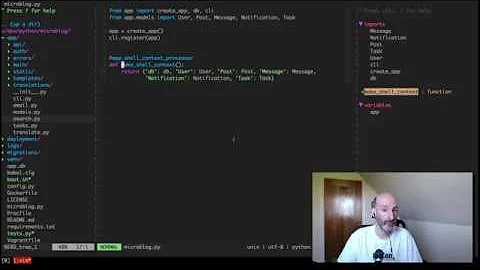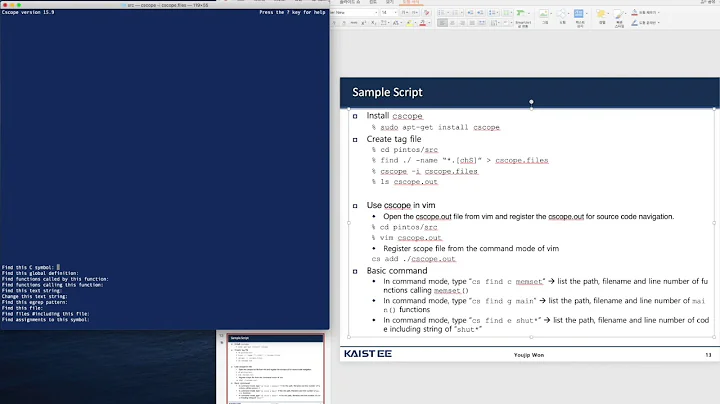Using cscope to browse Python code with VIM?
Solution 1
- From a correspondence with the maintainer of
cscope, this tool isn't designed to work with Python, and there are no plans to implement that compatibility. Whatever works now, apparently works by mistake, and there is no promise whatsoever that it will keep working. - It appears I've been using an out-of-date version of
pycscope. The latest version 0.3 is supported by thecscopeDB. The author ofpycscopetold me that he figured out the output format for thecscopeDB from reading the source code ofcscope. That format isn't documented, on purpose, but nevertheless it currently works withpycsope0.3, which is the solution I'll be using.
I'm going to accept this answer since unfortunately no other answer provided help even after bounty was declared. No answers are upvoted, so I honestly have no idea where the bounty will go.
Solution 2
EDIT: I'm going to run through the process step by step:
Preparing the sources:
exhuberant ctags, has an option: -x
Alternatively, ctags can generate a cross reference file which lists,
in human readable form, information about the various source objects
found in a set of language files.
This is the key to the problem:
ctags -x $(ls **/*.py); # replace with find if no zsh
will give you your database of source objects in a known, format, described under
man ctags; # make sure you use exuberant ctags!
Gnu Global is not limited to only the "out of the box" type of files. Any regular file format will serve.
Also, you can use gtags-cscope, which comes with global as mentioned in section 3.7 of the manual, for a possible shortcut using gtags. You'll end up with an input of a ctags tabular file which Global/gtags can parse to get your objects, or you can use the source for pycscope together with your ctags file of known format to get an input for the vim cscope commands in
if_cscope.txt.
Either way it's quite doable.
Perhaps you'd prefer idutils?
Definintely possible since
z3c.recipe.tags
on pypi makes use of both ctags and idutils to create tag files for a buildout, which is a method I shall investigate in short while.
Of course, you could always use the greputils script below, it has support for idutils , we know idutils works with python, and if that fails, there is also something called vimentry from this year that also uses python, idutils and vim.
Reference links (not complete list):
- gtags vimscript, uses Gnu global. updated 2008
- greputils vimscript, contains support for the *id idutils, 2005
- lid vimscript, Ancient, but this guy is pretty good, his tag and buffer howtos are amazing 2002
- An updated version of pyscope, 2010
Hopefully this helps you with your problem, I certainly helped me. I would have been quite sad tonight with a maggoty pycscope.
Solution 3
This seems to work for me:
Change to the top directory of your python code. Create a file called cscope.files:
find . -name '*.py' > cscope.files
cscope -R
You may need to perform a cscope -b first if the cross references don't get built properly.
Solution 4
There is a wonderful Python-mode-klen plugin. If you have it and rope (python refactoring library) installed, then going to the definition of a particular term is as simple as <C-c>g or <C-c>rag (first is filetype mapping, second is a global one). There are much more useful features, some useless for me. All of them are disableable. Features from list of questions found at cscope-intro:
-
Where is this symbol used? <C-c>f. Rather confusing though, as results in quickfix list do show
-instead of the actual lines (though they point to the correct location). Maybe it will be fixed. - Where is it defined?, What is this global symbol's definition?, Where is this function in the source files? <C-c>g
- What is <...> global symbol's definition? <C-c>raj
Not very much, but I am not too experienced user of ropevim.
Related videos on Youtube
Comments
-
Eli Bendersky almost 2 years
Has anyone managed successfully using
cscopewith Python code? I have VIM 7.2 and the latest version ofcscopeinstalled, however it doesn't get my code's tags correctly (always off by a couple of lines). I tried thepycscopescript but its output isn't supported by the modern version ofcscope.Any ideas? Or an alternative for browsing Python code with VIM? (I'm specifically interested in the extra features
cscopeoffers beyond the simple tags ofctags)-
ssokolow over 13 yearsHave you considered simply fixing pycscope? I haven't looked at what needs to be done, but I can't imagine it being too difficult. Also, you may want to update your question to mention that, as your blog post says, cscope is thrown off by Python comments.
-
Eli Bendersky over 13 years@ssokolow: The problem with fixing
pycscopeis that the "DB" formatcscopeuses isn't documented, and according to the maintainer ofcscopethis is by design -
ssokolow over 13 yearsAhh. That WOULD be unpleasant. I'd have to think about what solution I'd attempt in that situation.
-
GWW over 13 yearsEven trying to modify cscope is a disaster. I can find the code used to identify comments, but I think it would be a mess to try and include # and """ in the comment code. Perhaps the easiest way would be to preprocess the source files and strip the comments (replacing them with blank lines). But again, that's not very fun because cscope doesn't work with standard input.
-
Jarekczek almost 12 yearsDoxygen natively supports only C and Java, but through PREFILTER option it is able to process any programming language files. Filtering app needs to be written for the language. I also submitted (as patch #3413344), prefilter option to ctags. Maybe it would be nice to have it in cscope also.
-
-
Eli Bendersky over 13 yearsgnu global doesn't support Python, grep utils obviously isn't what I'm looking for... why do you link to pycscope's source code?
-
Dave Kirby over 13 yearsWhy do you use
$(ls **/*.py)instead of**/*.pyon its own? AFAIK in zsh they are equivalent, and will both expand to the list of matching files in all subdirectories. -
 chiggsy over 13 yearsshrugs You wanted an alternative to cscope, which would be idutils. They perform similar tasks.
chiggsy over 13 yearsshrugs You wanted an alternative to cscope, which would be idutils. They perform similar tasks. -
Eli Bendersky over 13 years@chiggsy: AFAIU idutils is more a replacement for
grepthan forcscope -
Eli Bendersky over 13 yearsI've decided to grant you the bounty since you've done a solid amount of research trying to help me solve the problem. Keep up the good work on SO
-
Mu Mind almost 13 years"something called vimentry" - is this referring to exVim, which has
your_project.vimentryfiles? That's all I could find from googling. -
Yoni Zohar almost 6 yearsI can find <C-c>g in their documentation, but not <C-c>f. Could you please provide a reference, or the actual command that is called when pressing <C-c>f?
-
ZyX almost 6 years@YoniZohar github.com/klen/python-mode/blob/…, then github.com/klen/python-mode/blob/…. I do not recall where I got this mapping in the first place though,
git log --patch doc/pymode.txtshows that it was never in documentation. -
tron5 almost 6 yearsGreat Tip! Works with PHP too, for me: ("PHP and cscope in vim"):
find . -name '*.php' > cscope.files && cscope -Rb---bfor saving the results (in cscope.out and using them in vim).







